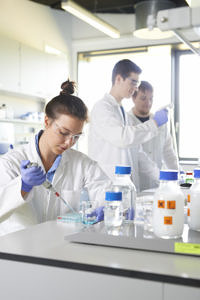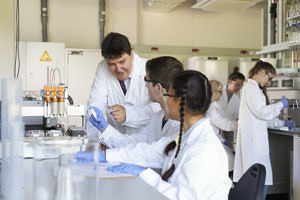Research Laboratory (M6.2)
The practical module Research Laboratory (module M6.2 in your module catalog) emphazises the research focus of the degree program. It is not an industry internship but is usually conducted at the university. The Research Laboratory module is meant to be a miniature Master’s project in order to prepare you for your final Master’s thesis. It is also oftentimes your entry point to doing a Master’s thesis with the same lab. Therefore, it is strongly recommended that you carry out the academic laboratory in your penultimate semester (i.e. when they already have acquired around 60 ECTS and want to start your master’s thesis in the subsequent semester).
You have to find a project and a supervisor at one of the chairs at the Faculty of Engineering. The Research Lab module is usually not a course that you can find in Campo but an individual project that you organize by yourself by contacting researchers at the chairs/labs you are interested in. For a start, it is always a good idea to have a look at the respective chair’s website. They all have a section called “research”, “student projects” or similar. But don’t be afraid to contact the staff directly and ask whether you can participate in a project they are working on if you cannot find it in the “student projects” section.

Research laboratory projects at the Faculty of Science or the Faculty of Medicine can only be chosen if they have a clear focus on engineering and you are supervised by a professor with a technical background. Please contact your study advisor for more information before you take on any projects at these faculties.
All information on the procedure and content of the Research Laboratory can be found in the English Module Description. The research laboratory can be started and ended at any time that you agree on with your supervisor and that comprises the required workload of 150 hours. At the end of the Research Laboratory you must summarize your research in an academic paper (4-6 pages). It is not required to register the research project when you start it but please be aware that your supervisor has to fill out the Certificate of Research Laboratory to confirm your successful completion of the module. Please submit this form to Mrs. Jahreis of our Examinations Office.
The Research Laboratory´s subject is assigned by an academic supervisor and will be processed at his/her lab – or at an external institution if the supervisor agrees in a cooperation with external parties. The workload comprises 150 hours (equivalent to 5 ECTS credits) and can be carried out alongside your studies. The concrete time distribution has to be agreed upon with the supervisor. The Research Lab is ungraded (pass/fail). The Research Laboratory training can be completed during the regular lecture period (e.g. one day per week) or during the lecture-free period (semester break). You can organize the time distribution on an individual basis with your supervisor.
A company (or other external institution) can be an external partner, i.e. you can combine your Research Laboratory with an industry internship if it meets the requirements of the module description. In any case, it is your duty to find a supervisor at our Faculty of Engineering who will take academic responsibility for your Research Laboratory and sign your certificate. It is of utmost importance that your find an FAU supervisor before you sign any contracts with a company! The best way to carry out the Research Lab in collaboration with an industry partner ist to talk to potential FAU supervisors first and ask them whether they have a cooperation with external partners.
The research lab is well suited as an academic achievement that can be completed as part of a semester abroad. In this case, the university abroad is the external partner. In addition, you will need a suitable academic supervisor at FAU to issue the certificate for the research lab.
Besides the approach to finding an individual research lab project described above, you can also carry out a combination of Research Lab (M6.2) and Academic Lab (M6.1) at the same lab with the same supervisor. “Ready-made” combination modules for M6.1 and M6.2 can be found in you module catalog under module group M6. The respective courses can be found in Campo, registration for then usually takes place via StudOn (in August/September for the winter semester or February/March for the summer semester). Moreover, you can agree individually with a suitable supervisor to carry out both, the research and academic lab with them. In this last case, two indicividual certificates must be issued by the supervisor (the above form for the Research Lab and the documentation for the Academic Lab described here).

Foto: FAU